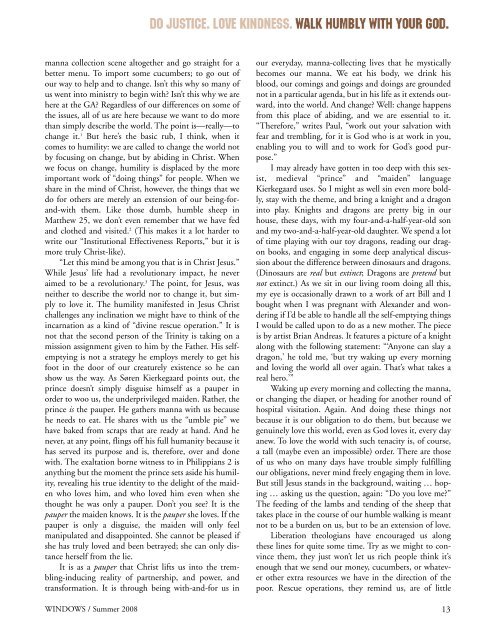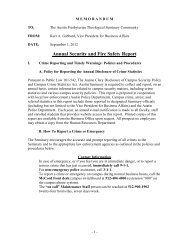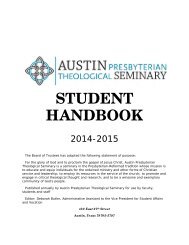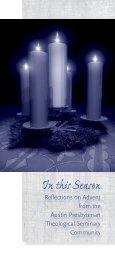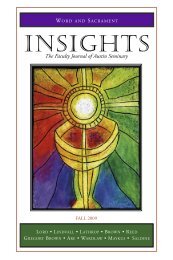AUSTIN PRESBYTERIAN THEOLOGICAL SEMINARY
windows summer 03 - Austin Presbyterian Theological Seminary
windows summer 03 - Austin Presbyterian Theological Seminary
- No tags were found...
You also want an ePaper? Increase the reach of your titles
YUMPU automatically turns print PDFs into web optimized ePapers that Google loves.
manna collection scene altogether and go straight for a<br />
better menu. To import some cucumbers; to go out of<br />
our way to help and to change. Isn’t this why so many of<br />
us went into ministry to begin with? Isn’t this why we are<br />
here at the GA? Regardless of our differences on some of<br />
the issues, all of us are here because we want to do more<br />
than simply describe the world. The point is—really—to<br />
change it. 1 But here’s the basic rub, I think, when it<br />
comes to humility: we are called to change the world not<br />
by focusing on change, but by abiding in Christ. When<br />
we focus on change, humility is displaced by the more<br />
important work of “doing things” for people. When we<br />
share in the mind of Christ, however, the things that we<br />
do for others are merely an extension of our being-forand-with<br />
them. Like those dumb, humble sheep in<br />
Matthew 25, we don’t even remember that we have fed<br />
and clothed and visited. 2 (This makes it a lot harder to<br />
write our “Institutional Effectiveness Reports,” but it is<br />
more truly Christ-like).<br />
“Let this mind be among you that is in Christ Jesus.”<br />
While Jesus’ life had a revolutionary impact, he never<br />
aimed to be a revolutionary. 3 The point, for Jesus, was<br />
neither to describe the world nor to change it, but simply<br />
to love it. The humility manifested in Jesus Christ<br />
challenges any inclination we might have to think of the<br />
incarnation as a kind of “divine rescue operation.” It is<br />
not that the second person of the Trinity is taking on a<br />
mission assignment given to him by the Father. His selfemptying<br />
is not a strategy he employs merely to get his<br />
foot in the door of our creaturely existence so he can<br />
show us the way. As Søren Kierkegaard points out, the<br />
prince doesn’t simply disguise himself as a pauper in<br />
order to woo us, the underprivileged maiden. Rather, the<br />
prince is the pauper. He gathers manna with us because<br />
he needs to eat. He shares with us the “umble pie” we<br />
have baked from scraps that are ready at hand. And he<br />
never, at any point, flings off his full humanity because it<br />
has served its purpose and is, therefore, over and done<br />
with. The exaltation borne witness to in Philippians 2 is<br />
anything but the moment the prince sets aside his humility,<br />
revealing his true identity to the delight of the maiden<br />
who loves him, and who loved him even when she<br />
thought he was only a pauper. Don’t you see? It is the<br />
pauper the maiden knows. It is the pauper she loves. If the<br />
pauper is only a disguise, the maiden will only feel<br />
manipulated and disappointed. She cannot be pleased if<br />
she has truly loved and been betrayed; she can only distance<br />
herself from the lie.<br />
It is as a pauper that Christ lifts us into the trembling-inducing<br />
reality of partnership, and power, and<br />
transformation. It is through being with-and-for us in<br />
our everyday, manna-collecting lives that he mystically<br />
becomes our manna. We eat his body, we drink his<br />
blood, our comings and goings and doings are grounded<br />
not in a particular agenda, but in his life as it extends outward,<br />
into the world. And change? Well: change happens<br />
from this place of abiding, and we are essential to it.<br />
“Therefore,” writes Paul, “work out your salvation with<br />
fear and trembling, for it is God who is at work in you,<br />
enabling you to will and to work for God’s good purpose.”<br />
I may already have gotten in too deep with this sexist,<br />
medieval “prince” and “maiden” language<br />
Kierkegaard uses. So I might as well sin even more boldly,<br />
stay with the theme, and bring a knight and a dragon<br />
into play. Knights and dragons are pretty big in our<br />
house, these days, with my four-and-a-half-year-old son<br />
and my two-and-a-half-year-old daughter. We spend a lot<br />
of time playing with our toy dragons, reading our dragon<br />
books, and engaging in some deep analytical discussion<br />
about the difference between dinosaurs and dragons.<br />
(Dinosaurs are real but extinct; Dragons are pretend but<br />
not extinct.) As we sit in our living room doing all this,<br />
my eye is occasionally drawn to a work of art Bill and I<br />
bought when I was pregnant with Alexander and wondering<br />
if I’d be able to handle all the self-emptying things<br />
I would be called upon to do as a new mother. The piece<br />
is by artist Brian Andreas. It features a picture of a knight<br />
along with the following statement: “‘Anyone can slay a<br />
dragon,’ he told me, ‘but try waking up every morning<br />
and loving the world all over again. That’s what takes a<br />
real hero.’”<br />
Waking up every morning and collecting the manna,<br />
or changing the diaper, or heading for another round of<br />
hospital visitation. Again. And doing these things not<br />
because it is our obligation to do them, but because we<br />
genuinely love this world, even as God loves it, every day<br />
anew. To love the world with such tenacity is, of course,<br />
a tall (maybe even an impossible) order. There are those<br />
of us who on many days have trouble simply fulfilling<br />
our obligations, never mind freely engaging them in love.<br />
But still Jesus stands in the background, waiting … hoping<br />
… asking us the question, again: “Do you love me?”<br />
The feeding of the lambs and tending of the sheep that<br />
takes place in the course of our humble walking is meant<br />
not to be a burden on us, but to be an extension of love.<br />
Liberation theologians have encouraged us along<br />
these lines for quite some time. Try as we might to convince<br />
them, they just won’t let us rich people think it’s<br />
enough that we send our money, cucumbers, or whatever<br />
other extra resources we have in the direction of the<br />
poor. Rescue operations, they remind us, are of little<br />
WINDOWS / Summer 2008 13


